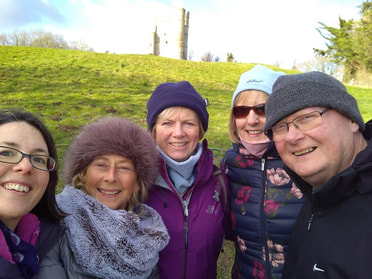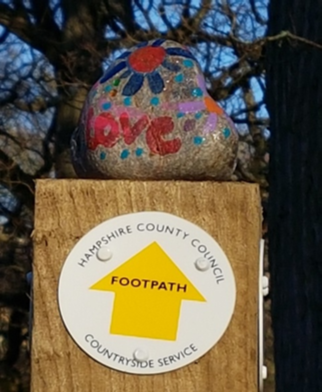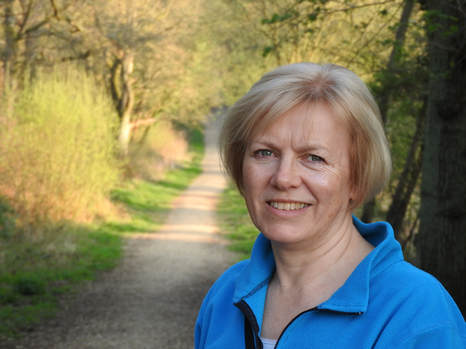 This month in our Fresh Air Friday sessions across the country we've been talking about relationships and exploring ways we can deal with relationships in our lives which challenge us. Healthy relationships and good social connections are some of the most important aspects of life, we thrive through connecting with others. Strong relationships support us in difficult times and it is essential for our long term well-being and happiness to have positive relationships. Each of us is different, we have our own individual way of interacting with the world around us and how we interpret what is happening around us. There can be times when mis-understandings lead to difficulties in relationships. We also tend to run patterns of behaviour with certain people based on what has happened in the past. During my Fresh Air Fridays sessions in March we spent a lot of time talking about patterns which play out in the various relationships in our lives. Many of the ones we discussed were in families and in groups of friends where we know each other well. An example that came up for me is my relationship with my sister. I don't see her often because she lives abroad, but when I do it doesn't take long before I get irritated by her. We see the world in very different ways and some of the patterns we run with each other go back to our childhood. As well as patterns playing out between the two of us, there are also behavioural patterns going on at the family level. Here are some of the ways I've looked at our relationship and changed how I feel: None of us can change another person's behaviour, but by taking ownership for how you feel about the relationship, thinking about things from the other person's perspective and being open in how you communicate, you can create foundations for building better relationships. Consider a different perspective I can't change my sister's behaviour, but I can choose how I respond to it, particularly when she does things that annoy me. One thing I've been doing since talking about this on a Fresh Air Fridays session, is to look at things from her perspective and see if I can understand her intentions. One thing I thought about when doing this is that she lives in another country away from her family and has lived there for 20 years. What this means is that when she comes over to the UK she wants to catch up with everyone and have big family gatherings. She lives in the Mediterranean where both the working and leisure culture are very different to the UK as well as the weather. These things combined lead to her flitting in and out at all times of the day and I'm never sure when she will be home. I want to be a good host, be sociable and provide her with nice food, however I'm not sure what time of day or night she will be around. Last year when she visited I was going through a particularly stressful time which meant I easily reacted to the not knowing when she would be home. By re-framing it and seeing what might be going on for her, I've been able to let go of my annoyance and have a conversation around what works best for both of us plus the practicalities for her of travelling around the UK and visiting all the family when she is here. Something one of my members said whilst talking about her challenging relationship was that she now treats all her interactions with this person as a learning opportunity. I'm now learning how to respond when my sister pushes my buttons and take a more realxed approach to her stays. Give yourself permission to experience the emotions that come up Some times even when we look for the intention behind someone's behaviour, it is still difficult to change how we feel about it. On these occasions it can be good to get out for a walk and give yourself permission just to feel the emotions that are coming up for you. We don't often give ourselves the time or permission to reflect on how we feel about situations and be kind to ourselves. I spent some time whilst out walking letting myself become aware of the emotions I was feeling after a phone call with my sister. It was good to recognise my irritation and annoyance, realise what message it was giving me and then move on to something calmer. Be kind to yourself Finally, many of us spend time doing the best we can for others and taking responsibility for how we behave towards others, yet we don't think about how we treat ourselves. Whilst addressing some of the difficulties mentioned above, there could be the voice inside your head being very critical about what you are doing. Take some time every day to write down three things that have gone well for you that day. Remember.... The only person we can ever change is ourselves - ‘Be the change you wish to see in the world’.
1 Comment
This month in my Fresh Air Fridays sessions we have been talking about our relationships with others and focusing on those interactions which irritate us. How often do you find yourself saying something like? ‘she made me angry’, ‘they were so frustrating’ or perhaps ‘he wound me up so much I couldn’t enjoy myself’ All of these are our reactions to behaviours which we have seen in someone else and have chosen ourselves how we will react to them. When we started thinking about occasions when someone had irritated us recently, it did not take long for all of us to come up with recent examples. One person talked about their manager who always wanted more from her, and the team member who was forever doing different tasks to the ones she had been asked to do. Then there was the lodger who was irritating one of us because he hadn’t done something that had been asked of him several times and seemed to be taking no notice of several the rules he had been asked to sign up to when signing his lease. For all of us, these were small things that were annoying us but we all noticed that they were gradually distracting us more and more because we were avoiding having a difficult conversation. Thinking differently about the relationship After identifying interactions that were irritating us we then went on to consider the interaction from a different perspective and to see if we could reframe it into something more positive. We also thought about what positive intention the other person may have had in the way they behaved. By looking for a positive intention and reframing the behaviour of others into something more positive we can start to change how we react to their behaviour. It doesn’t matter whether the positive intention is what the other person is actually thinking because it is a story we are running for ourselves, in the same way as our reaction to their behaviour is a story we are running. The team member who was doing different tasks was new to the team and was perhaps looking to go over and above what had been asked to make a good start and feel that she belonged to the team. The lodger was having a difficult time at work and perhaps he had overlooked some of the house rules due to being overwhelmed and feeling unwell. When looking at the relationships from these new perspectives, we all found that we could consider things more objectively and came up with plans on how to have the conversations we wanted to have in a respectful way. Next stepsNext time you notice that you are starting to feel annoyed or irritated by someone else’s behaviour, acknowledge this and see if you can find the positive intention in what they are doing.
If you find you are really stuck with this and can’t feel better about the relationship, then go for a walk and give yourself permission to feel whatever negative emotion there is without any judgement. This is often the first step in dissipating the negative feelings. |
Details
Archives
July 2020
Categories
All
|




 RSS Feed
RSS Feed